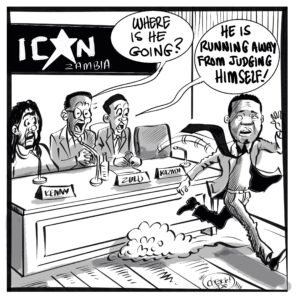Alliance for Democracy and Development (ADD) president Charles Milupi has accused government of lying to the Zambian people on the importation of power from South Africa’s utility Eskom.
Last week during a joint press briefing, Eskom’s chief operating officer Jan Oberholzer told the media that the contract signed with Zesco was “non-firm”, meaning that the power export deal with Zesco was dependent on whether or not South Africa’s utility had excess power to export.
But Zesco, during a press briefing last week, revealed that the company was facing challenges in importing the full 300 MW from time to time because of the limited availability of the wheeling path during off peak periods.
And in a ministerial statement to Parliament last Friday, Energy Minister Mathews Nkhuwa said Eskom had a contractual obligation to supply power to Zambia despite South Africa also facing a power deficit.
However, Milupi said the power importation deal lacked transparency and that wheeling of electricity to Zambia should not be a challenge as the two countries were connected.
“I don’t think there is transparency in the stories that we are getting [from government]. When it was first announced that we are going to get power from South Africa, I said…that is not very feasible; South Africa is also a deficit country looking for power. In fact, they were already [experiencing] load shedding. So I said the only country that has surplus power is Mozambique. Unfortunately, those people who generate power are still owed a lot of money from Zesco,” Milupi said.
“Now it looks like the Zambian government, that is Zesco and Ministry of Energy, instead of saying how it is, they are telling all sorts of stories. They claimed that they paid $27 million, $7 million was towards the old debt and $20 million was towards supply for one month. Now because the Zambians have not felt the impact of the importation of power, they are saying ‘transmission capacity problems’…that is false. The sub-connection [is there]. South Africa is solidly connected to Zambia, there can be no problem of connectivity.”
He assumed that the current power deficit facing South Africa and the debt owed by Zesco to Eskom had played a part in the challenges facing the power importation deal.
“With regard to South Africa, there are two issues: the first issue is that they also are a deficit country. They are going through serious power problems in the country, including load shedding. So for Zambia to depend on South Africa, I think it is not facing reality…a couple of years ago…the President of this Country Mr Edgar Lungu said ‘why should we construct generators and why should we have generating plants when we can buy power from South Africa?’ That was absolutely an unbelievable statement to come from a Head of State because South Africa can never be a major supply of power into the region. In fact, Zambia was the one which was created to be a surplus energy capacity country; except that various governments, MMD and this PF government, took the eye off the ball. Instead of increasing that capacity even as demand was growing, they worked to create another particular crisis,” Milupi said.
“The second issue that we have with South Africa not supplying power is that Zesco already owes Eskom a lot of money, millions of dollars!…The only problem with power coming into Zambia are the two problems that I have talked about. That we already owe them money and that they are a deficit country also.”
He urged the government to tell the Zambians the true situation on the ground regarding the power importation deal.
“So in terms of technical explanations, Zambians are not being given the full stories. But the truth is that they owe money; this government doesn’t have money, Zesco doesn’t have money and in order to hide that, they are coming up these technical reasons… The sectors that use power; the manufacturing sector, the processing sector, these can schedule their times if you tell them the truth but if you continue telling them lies, they cannot plan. That is why they shut down plants, they lay workers off and that is already happening in Zambia. Going forward, we have to have a government that understands the need to invest, whether it’s the private sector or the public sector, in increasing our generating capacities,” said Milupi.

























One Response
Another event is that many people seem to have understood better the South African electricity company (ESCOM) explanation on it’s non firm electricity export contract with Zesco than the Zesco explanation. We need prayers bane…